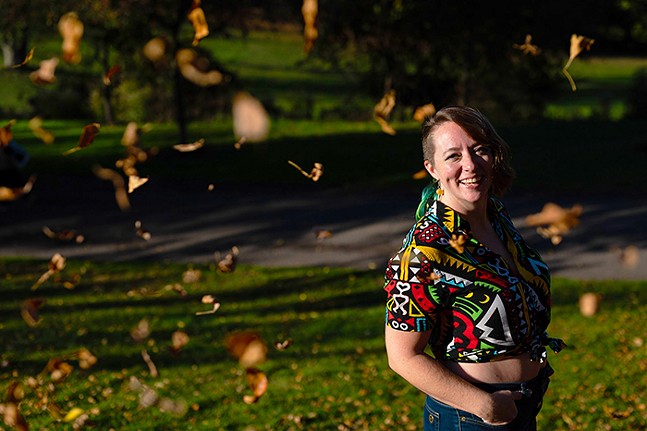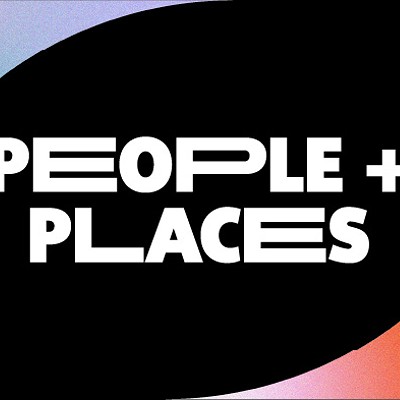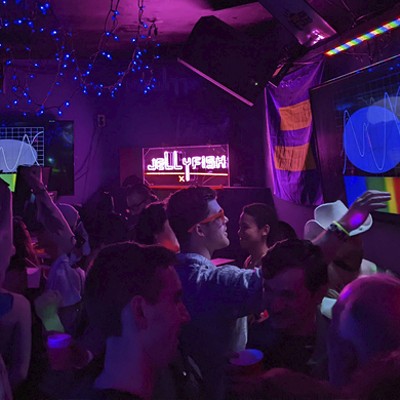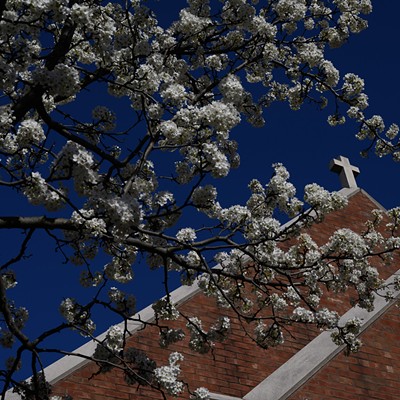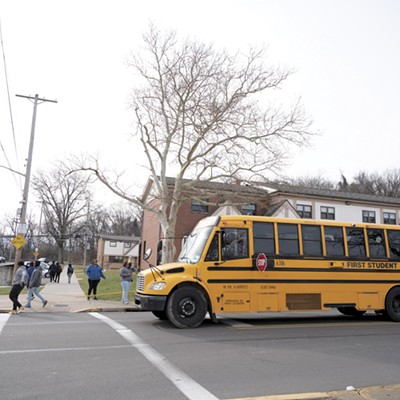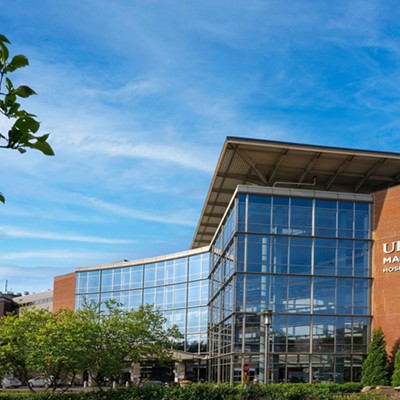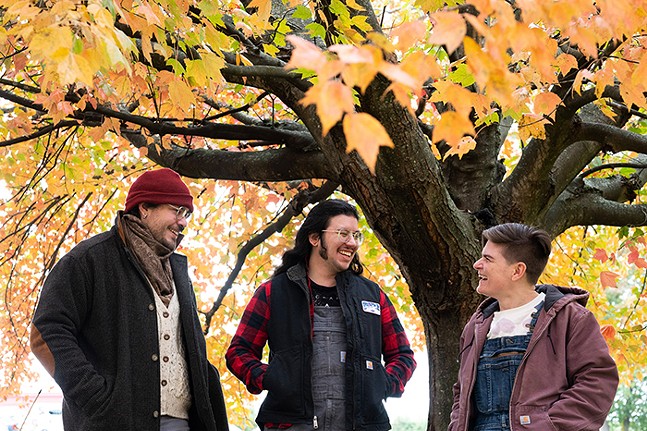
One thing no one ever tells you about ethical non-monogamy (or ENM) is how much you end up valuing your alone time. This may seem strange — or totally understandable — when considering that every iteration of ENM, from the polycule to swinging, means you're making time for multiple people.
After days of scheduling around dates and sleepovers, the prospect of a solo night with a movie and takeout seems positively blissful.
Celine Roberts, a Pittsburgh wine professional who, along with her husband, also maintains relationships with two other partners, says that, more than anything, practicing non-monogamy requires a ton of time management.
“By no means am I like a master of it,” says Roberts, who first started exploring relationship structures outside traditional monogamy 15 years ago. “I definitely have Google Calendar’d myself into a corner.”
Roberts says that, while she has always been a person that “needs recharge time,” she believes practicing non-monogamy has reinforced how important it is to keeping her life, and mood, in order.
“I have a large group of friends who I love dearly and I want to maintain my relationships with them,” she adds. “They are just as important as my relationships with my romantic partners. I have my family, I have my hobbies, I have my work. My life is, happily, very full. But there have been times that I've lost sight of needing my own time in that busyness, and when I do that, I am a markedly worse person.”
Roberts is one of three people who spoke with Pittsburgh City Paper about ENM, one of many terms used to describe a spectrum of relationship structures that openly and consensually involves multiple partners (others common terms include polyamory and consensual non-monogamy). These people espouse different views, definitions, and approaches to the practice, while also agreeing that their chosen paths have given them a freedom not inherent to traditional monogamy.
They also speak to the challenges of being non-monogamous, especially in a city as semi-conservative, and small, as Pittsburgh.
Like Roberts, Melissa Rogers agrees that juggling time with her two partners has made her recognize her own capacity, and that she needs “social recovery time.”
“At the time that I started identifying as polyamorous, I really was just overloaded with everything,” she says. “Not just my relationships, but in my work, my school, just doing everything all the time and being overbooked.”
(Rogers and another source use she/her-they/them pronouns, but given the relationship dynamics in this piece, she/her will be used to avoid any confusion).
Rogers, a local arts educator, says she first started looking into non-monogamy in 2014 while pursuing her Ph.D. in Maryland.
“I was with a partner at the time, both of us were bisexual, both of us wanted experience with other genders than the ones that we were,” she says. “And we kind of were like, okay, it seems like we're not going to get everything that we want out of just our relationship. And so, we were like, what if we wanted to explore this? And it was really rocky for a long time. And then, at the time that I met my current partners, I also had a third long-distance partner who had been with me for a long time before that. So, it's kind of an overlapping saga.”
Rogers now has a “nesting partner,” a term used to describe someone with whom you live. Her other partner lives nearby, which she adds is “awesome.” She met them both five years ago.
“We all hang out,” she says. “My two partners don't really date each other. But they do have an ongoing conversation about, like, what is our relationship to each other? They have their own kind of process, and I try as much as possible to let them organize that on their own.”
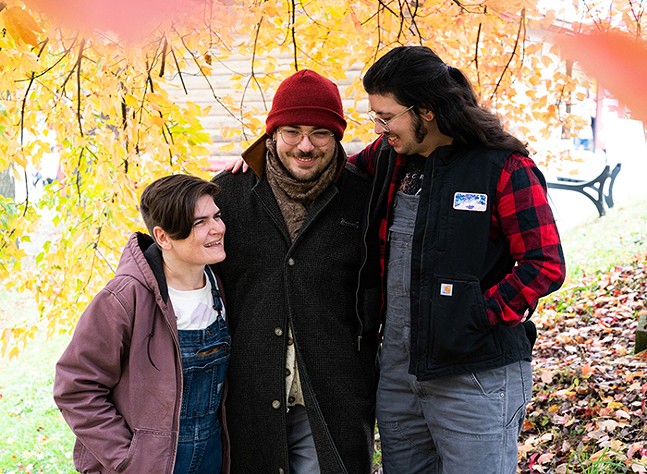
Rogers explains that, beyond the romantic aspect, practicing non-monogamy has added a level of security to her and her partners’ lives. This ranges from supporting each other financially to sharing household duties like preparing meals. It even extends to pet care.
“My one partner just got a dog, which has been their lifelong dream,” she says. “But it was just a lot of change really fast of, okay, we're going to pick this little guy up and we got to get all this stuff. And they were just like, wow, really glad to have an extra set of hands.”
This ultra-domestic scene stands in stark contrast to portrayals of non-monogamy in the media, many of which involve hyper-sexual images of orgies and illicit underground sex clubs.
“I would say it's 99% not sex,” Roberts says with a laugh, adding, “It is not glamorous.”
Both Rogers and Roberts believe that practicing non-monogamy has also allowed them to explore aspects of themselves that would not be possible in a more rigid monogamous relationship structure. Roberts, who identifies as queer, believes non-monogamy naturally appeals to those already outside of what society considers “normal.” Rogers, who currently identifies as non-binary, says she and her partners (both of whom, she says, use he/him-they/them pronouns) are “all kind of figuring out” their genders.
“We're all a bunch of ‘they gays,’” she laughs, explaining that she has openly questioned whether or not she is trans. “We don't know how our lives are gonna change if one of us, or all of us, transition. But we're still here for it. And there's an open line of communication that that stuff isn't gonna get pushed under the rug … and I think just having people that you can talk about that stuff with without fear and without judgment, that's a lifesaver.”
Rogers and Roberts agree that, as information has become more available via the internet and people have become aware of non-monogamy as a practice, the scene has become more prominent, even in Pittsburgh. This provides a more accessible path compared to how Roberts first discovered non-monogamy in her early 20s while working on a farm in Idaho, where she found a copy of The Ethical Slut, a non-fiction exploration of polyamory, in the trailer she was staying in.
“I feel like I'd always maybe gravitated toward this but didn't have a word for it, and just kind of thought I was a bad person,” she adds. “And it was like, okay, there is a word for some of these feelings and maybe you're not such a bad person. And maybe there's a way to pursue this that isn't harmful and hurtful to yourself and others. And that's kind of what tipped things off.”
From there, she says she attended regional Burning Man events and “met a bunch of people [in] their 50s who have been doing this for the better part of 30 years and seemed very happy, and young folks, and everyone in between, and that got me just sort of more familiarized and more comfortable."
“It seemed like this wild thing then, and now it just sort of seems like a choice you can make if you want to, and as long as you're being a decent human being, it’s just the same as any other choice,” she says.
Still, Roberts admits that stigma still very much exists around non-monogamy, especially in Pittsburgh, which she calls “the smallest town and the most nebby town in the universe.” While she has come out to and been accepted by her family and friends about being ENM, “there have been instances when people know and their behavior toward me changes or they mistrust my friendship all of a sudden,” she says.
“And that really bums me out,” she adds. “Like, if I wanted to date you, you'd know it.”
Still, she believes talking openly about it benefits not only her, but the local non-monogamous community.
“I feel like because I'm a white middle-class lady who has a lot of privileges, that I can try to talk about this kind of stuff and try to bring some light to it,” she says. “And if that helps someone else that has a higher risk for being treated poorly or discriminated against, then that's a good thing. It’s nothing to be ashamed of and I think there's still a part of me that occasionally struggles with that.”
One person working to eliminate the stigma around non-monogamy is Trisha Swindell, a local graphic designer, event planner, and self-described community organizer. Swindell, who grew up in South Park, first became polyamorous eight years ago and now has three long-distance partners.
While living in San Diego, Calif. and working for a major nonprofit, Swindell started organizing queer meetups and events on the Bloom app. She says that Bloom then hired her to host events all over the country, including in California, Oregon, Texas, and Florida.
After moving back to Pittsburgh, she used her experience to launch the CNM (formerly ENM) Social Club at Belvedere’s Ultra-Dive in Lawrenceville. The monthly meetup first started in November 2022, and, since then, they have, by Swindell’s estimate, attracted anywhere from 20 to 35 attendees per night.
“I would say it is definitely a mix,” Swindell tells CP.
Swindell, who prefers the term consensual non-monogamy (something now reflected in the Social Club event name), says she wants to create spaces where all types of people feel able to safely and comfortably explore not only non-monogamy, but also the kink scene. This, she says, would mean making them as accessible as possible, including making events free or, at the very least, not cost prohibitive.
She believes events like CNM Social Club provide opportunities for attendees, especially newcomers who are nervous about being outed, to meet others in the non-monogamy community.
“What's nice about being outed in that space is you're not the only one being outed, you're both being outed together for the same thing to each other,” says Swindell. “And so, it's not like going and having your grandma see you or something, unless your grandma is poly and she shows up.”
Swindell now runs the CNM Pittsburgh Instagram account, where followers will find times and dates for the CNM Social Club and other poly-friendly events in Pittsburgh.
Beyond attending events like the CNM Social Club, Roberts and Rogers believe those interested in exploring non-monogamy should do their research, try making friends in the community, and seek out ENM-friendly therapists. They emphasize that, above all else, non-monogamy requires a lot of communication and self-reflection, as well as making sure to create fun, quality time with partners.
Roberts also points out that anyone pursuing non-monogamy should realize that everyone is “not going to act perfectly” all the time and that even when negative feelings or actions happen, you should “approach things with the idea that your partner does not wish you harm.”
“And I think that there's a lot of pros and a lot of cons. And obviously, I've decided that the pros outweigh the cons,” says Roberts. “I think part of the beauty of this is that I'm leaving it open, like, it's the flexibility, right? It's all coming back to checking in with yourself, checking in with other people, keeping in mind that people are human beings and not objects. And that things are going to change over the course of your life.”

